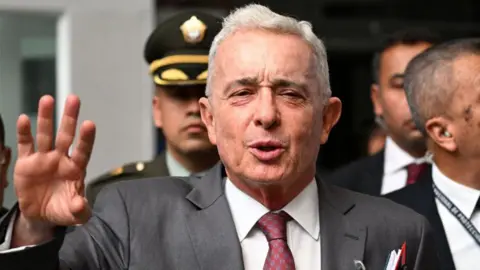INTERNATIONAL

"FORMER COLOMBIAN PRESIDENT ÁLVARO URIBE SENTENCED TO 12 YEARS HOUSE ARREST FOR WITNESS BRIBERY"
Historic Verdict: Ex-President Álvaro Uribe Gets 12 Years House Arrest for Witness Tampering
In a landmark ruling, former Colombian President Álvaro Uribe has been sentenced to 12 years of house arrest after being found guilty of witness bribery and procedural fraud. The decision marks the first time a former head of state in Colombia has received a criminal conviction.
The sentence was handed down by Judge Sandra Heredia of Bogotá’s 44th Criminal Court on Friday, just four days after she declared Uribe guilty of attempting to manipulate witnesses and obstruct justice. However, Uribe was acquitted of a separate charge of bribing a prosecutor.
Uribe, 73, served as Colombia's president from 2002 to 2010 and remains a powerful political figure. He has denied all wrongdoing and his legal team has already announced plans to appeal the decision.
Background of the Case
The case dates back over a decade. In 2012, Uribe accused Senator Iván Cepeda of falsely linking him to paramilitary groups. Instead of Cepeda being prosecuted, the Colombian Supreme Court turned the spotlight on Uribe, launching an investigation into whether he had tampered with witnesses to discredit Cepeda.
By May 2024, Uribe was formally charged with procedural fraud, bribery in criminal proceedings, and general witness bribery. His trial lasted 67 days and drew widespread national and international attention.
Reactions Across the Political Divide
The verdict has sharply divided public opinion in Colombia. Supporters of Uribe, including former President Iván Duque and other right-wing allies, continue to defend his innocence and criticize the judiciary. On the other hand, members of the current government and civil society groups have celebrated the ruling as a major step toward accountability and the rule of law.
Senator Iván Cepeda, who has been a central figure in the case, called the outcome a “victory for justice” but cautioned that “there is still a long way to go” as the legal process continues.
"This represents a significant development in our ongoing coverage of current events."— Editorial Board









